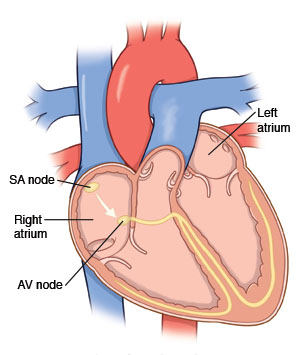Bradycardia

A slow heart rate is less than 60 beats a minute. That is called bradycardia. Bradycardia can be normal. Or it can be caused by medicines. Or it can be a sign of a disease. The slow heart rate may not be constant. It can come and go. It's a concern when it is very low, or when you have symptoms.
Symptoms
Symptoms of bradycardia are:
-
Dizziness or feeling lightheaded.
-
Weakness.
-
Trouble breathing.
-
Fainting.
-
Sleepiness.
-
More trouble exercising than normal because of tiredness (fatigue).
-
Confusion or trouble concentrating.
Causes
Bradycardia can have many causes. Some can be linked to your heart. But some may be linked to other things.
Nonheart-related causes:
-
Being older.
-
A side effect of certain medicines. These include beta-blockers, calcium channel blockers, digitalis, clonidine, lithium, and medicines to treat arrhythmias, such as amiodarone.
-
Health conditions, like low thyroid (hypothyroidism) and electrolyte disorder. Other examples are low body temperature (hypothermia) and sleep apnea.
-
Athletes, especially long-distance runners, may have a slow heart rate. This can be normal.
-
Brain injury, such as stroke or bleeding inside the brain.
Heart-related causes:
-
Coronary artery disease. This includes angina or past heart attack (acute myocardial infarction).
-
Heart valve disease.
-
Heart muscle disease (cardiomyopathy).
-
Congestive heart failure.
-
Sick sinus syndrome. This is when your heart's natural pacemaker is no longer working correctly.
-
Heart block. This is when your heart's natural electrical pathways no longer work correctly.
-
Diseases that enter the heart, such as sarcoid.
-
Heart infections.
Sometimes the cause for the arrhythmia can't be found.
Bradycardia that causes symptoms is sometimes reversible. When more severe bradycardia continues, you may need a pacemaker. Bradycardia may not cause symptoms. In this case, your health care provider may decide to watch it over time.
Home care
You can care for yourself at home:
-
Go back to your normal activities when you are feeling back to normal.
-
If you have any of the symptoms of bradycardia when you exert yourself, stop. Don't exert yourself. Wait until you have seen your health care provider for an assessment.
-
Work with your provider on any lifestyle changes you need. These might mean changing your diet, stopping smoking if you are a smoker, and starting an exercise program.
Follow-up care
Follow up with your health care provider as advised.
Call 911
Call 911 right away if:
-
You have chest pain.
-
You have chest pain that spreads to the shoulder, arm, neck, or back.
-
You have trouble breathing.
-
You have a slow heart rate with dizziness or lightheadedness.
-
You fainted or lost consciousness.
When to get medical care
Contact your health care provider if:
-
You have occasional weakness.
-
You feel dizzy or lightheaded.
-
You have abnormal trouble exercising.
Online Medical Reviewer:
Stacey Wojcik MBA BSN RN
Online Medical Reviewer:
Steven Kang MD
Date Last Reviewed:
1/1/2025
© 2000-2025 The StayWell Company, LLC. All rights reserved. This information is not intended as a substitute for professional medical care. Always follow your healthcare professional's instructions.